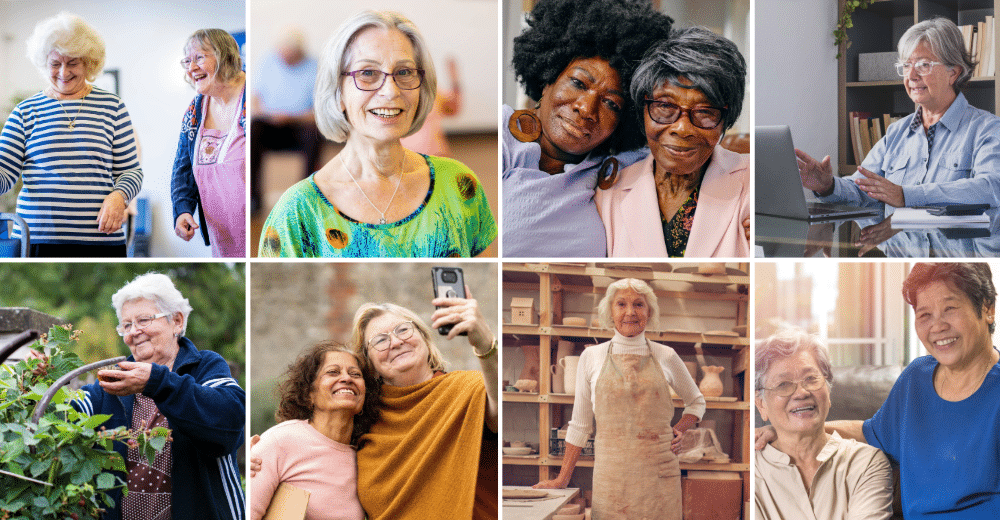
Photo Credits: First line(left to right): Centre for Ageing Better(first 2 pictures), Adobe Stock/Cultura Creative, Adobe Stock/Daniel | Second line(left to right): Adobe Stock/Khaligo, Centre for Ageing Better, Adobe Stock/Viacheslav Yakobchuk, Adobe Stock/Khunatorn
Imagine a Europe where women would be equal to men.
A Europe where women would no longer face multiple barriers throughout their lives. A Europe where women would have equal opportunities for education and work and receive equal pay for equal work. A Europe where women of all ages would be socially, economically and politically empowered…
How would a Europe look like for older women if there were policies designed to better support and empower them, to guarantee their full representation and integration into society?
Gender Equality in the Labour Market would be a reality
European employment policies and legal measures would consistently take into account the perspectives, lived experiences and challenges of older women. They would address multiple and intersecting forms of discrimination in the labour market and:
- Develop support services regarding motherhood.
- Implement the EU Care Strategy and strengthen the Work-Life Balance Directive (Directive (EU) 2019/1158) recognizing unpaid care work, valuing caring roles and thus enhancing work-life integration.

- Address stigma around menopause. Women would stop being discriminated against, marginalized or dismissed because of menopausal symptoms and workplaces would be adapted to persons experiencing such symptoms.
- Allow women to work part-time and/or reduced working hours by choice, not by obligation, notably because they are the main carers for children and/or other relatives.
- Offer quality working lives with opportunities to change career.
As a result, older women would have equal access and opportunities to the labour market as men. Women would be paid equally as men and the gender pay gap would become obsolete, such as the gender pension gap.
Being old and a woman would no longer put us at a higher risk of poverty
In a utopian Europe, older women would not face a higher risk of poverty or social exclusion.
During their lifecourse, career break and part-time work due to motherhood and/or other care responsibilities would be supported and mothers would not be economically penalised in the society.
A gender-inclusive pension system would be implemented in all Member States and would:
- Allow pension rights over the course of working lives with, for instance, flexible contributions options to accommodate career interruptions;
- Ensure that survivor benefits extend to same-sex partners and chosen family structures;
- Implement a mandatory report on gender disparities in retirement pensions;
- Promote economic independence in old age, including for older women.
Older women would have equal opportunities in getting sustainable pensions allowing them to live a life of dignity and stop being at risk of poverty.
Older women would be fully included in society
A gender equal Europe would guarantee the right of all women, including the oldest, in all their diversity, to participate. They would thus have equal opportunities to fully participate in society.
Older women’s right to participate would be tailored to their individual preferences and abilities and guaranteed through life. Their contribution to their communities would not only be recognised but also valued and they would have the choice to choose in which aspects of society they would like to participate such as in politics – notably in decision-making where they would have a say on all issues and at all stages of the policy cycle – culture, justice, employment, education and learning, in the same way as for other age groups. Older women would have a full, affordable and equitable access to essential services: access to places of participation, transportation, essential goods such as health and care services, food, housing and banking services or access to the internet, including in rural areas.
Older women would be better equipped to participate in society if:
- They were better supported with accessible lifelong learning for all, including to digital tools. There would be opportunities for education and training beyond retirement age, including affordable training for digital education;
- Member States would address the drivers of exclusion, eliminate the laws, policies, institutions and practices that deny the right of older people to fully participate in society, and tackle the systemic barriers that exclude older women;
- Offline alternatives as well as ‘service points’ with Internet access were ensured to guarantee the provision of information and participation in public life in sparsely populated areas.
The digital gap between generations would no longer exist and women would stop facing additional obstacles to their right to learn.
BUT the reality is that older women still face many inequalities
What we mentioned is all a pipe dream: women are systematically discriminated against because of their gender from an early age. This discrimination accumulates and intersects with ageism and other forms of discrimination in later life.
Some statistics
This dream can become a reality.
Here's how.
This dream can become a reality, but for that to happen, European policies and initiatives such as equality strategies must adopt an approach to gender and ageing that is intersectional and that supports all women, including older women.
An approach that is has a person-centred perspective across the lifecourse. An approach that is human rights-based, where older women would no longer be seen as passive recipients but as right-holders and full contributors to society.
There is hope…
The future Gender Equality Strategy is the opportunity to better integrate an age equality perspective and must explicitly address the needs and rights of older women to achieve true gender equality in Europe. It must include older women’s experiences and perspectives in different areas such as in employment and social protection, long-term care, gender-based violence, digitalisation, poverty and social inclusion.
Older people’s rights movements and organisations such as AGE Platform play a crucial role in ensuring that issues of gender and age discrimination are addressed together. More and more older women are visible and raise their voices around the world, supported by feminist movements. The role of older persons in such movements and civil society organisations is crucial in raising the voices of older women and making visible their experiences and perspectives. Older feminists of today where younger feminists of yesterday; they paved the way for fighting for our rights. Older women stand for themselves, but also for future generations.
Take Action
You can help make our vision – where older women enjoy equal rights – a reality by:



Every social media post helps us highlight the importance of the Age Equality Movement.
Thank you for your support!
Contact










